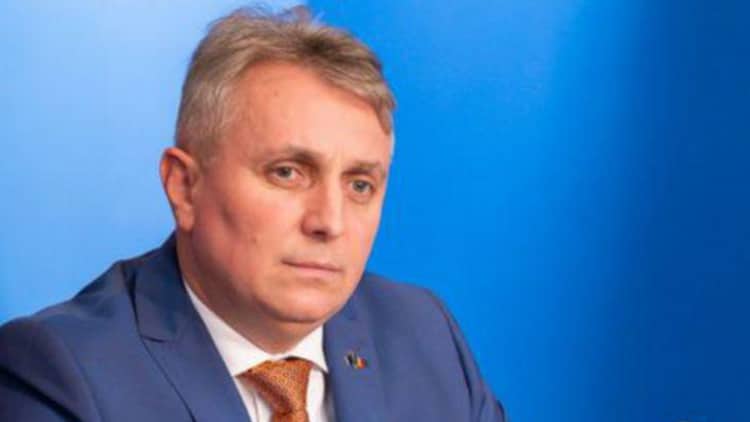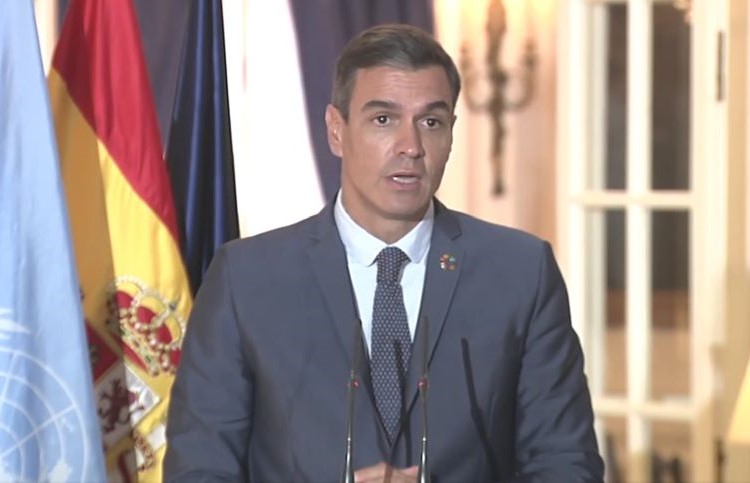Luis Ayllón
Romania’s Minister of Internal Affairs, Lucian Bode, says he is grateful for Spain’s support for his country’s accession to the Schengen area, which will benefit not only Romanians but all Europeans. Bode visited Romania yesterday, during which he met his Spanish colleague Fernando Grande-Marlaska.
What is the main purpose of your visit to Spain?
The meeting with my Spanish counterpart was an excellent opportunity to discuss issues of common interest, both on the European and bilateral agenda. The internal affairs component occupies a special place in the general agenda of our states, and the complexity of ties in this area is due especially to the presence on Spanish territory of the second largest Romanian community abroad.
I believe that bilateral meetings are very important to consolidate mutual trust and to identify common solutions to the problems we face, especially in the current international context. The existence of an in-depth dialogue, both at operational and ministerial level, is of direct benefit to the citizens of our States.
I discussed with my counterpart the best ways to intensify cooperation in the fight against cross-border crime, trafficking in human beings and Romanian crime in Spain, as well as Spanish crime in Romania, and to make ongoing projects more efficient.
Regarding the European agenda, we exchanged views on the most important issues on the agenda, such as asylum and migration, the management of external borders, Romania’s accession to the Schengen area and our key role in the EU security architecture.
We are also interested in continuing to promote, together with Spain, initiatives aimed at the defence of the common European space, whether we are talking about the internal security or the external security of the European Union.
I would like to mention that I greatly appreciate Spain’s continued support for Romania’s accession to the Schengen area. The achievement of this objective is not only in the interest of Romanians, but of all Europeans. For example, Spanish citizens doing business with Romania could thus benefit from all the facilities offered by Romania’s accession to the Schengen area.
At the same time, taking into account the large community of Romanian citizens in Spain, we want to deepen cooperation in the field of home affairs, making full use of all the instruments at our disposal. As Minister of the Interior, the situation of the Romanian community in Spain is of particular concern to me, and this visit is no coincidence.
How would you define relations between the two countries in the areas that affect your department?
I believe that relations between our institutions are excellent, both at the operational and strategic level. A Strategic Partnership between our countries was signed in 2013. The document foresees the intensification of bilateral relations in several areas, including home affairs.
Last year also saw the launch of the Romanian-Spanish Joint Commission on Home Affairs, created in the framework of the Convention between Spain and Romania on cooperation in the fight against crime. This discussion format allows experts from the Ministries of Interior of the two countries to consult each other on issues of concern in the framework of bilateral cooperation, i.e. to agree on concrete actions and initiatives contributing to the fight against crime. At the same time, this format provides the necessary framework to explore new areas of common interest.
In this context, I would like to highlight the readiness of the Romanian Police to deploy operational support specialists to support their Spanish colleagues in the prevention and fight against crime of Romanian origin and in assisting Romanian citizens on Spanish territory. I refer mainly to tourists and seasonal workers.
The fact that there is a large Romanian population in Spain and its important degree of integration in our country is undoubtedly a positive fact for both countries, but at the same time, being a very important community, problems can also arise. In the area of security, are there increased possibilities that criminal networks may want to take advantage of this integration of Romanians to use Spanish territory as a base of operations? How do you collaborate with the Spanish security forces in this area?
Preventing and fighting crime is a priority objective of the Romanian Government, and the measures taken and the strategies adopted by the authorities in Bucharest reconfirm our country’s commitment to ensure the security of citizens and to fulfil the obligations assumed at the international level and in the framework of bilateral cooperation.
The deepening of police co-operation is essential to prevent and combat unfortunate events which, unfortunately, often affect the entire Romanian community. It is important to underline that the vast majority of the Romanian community is very well integrated in Spain. However, even if they are isolated cases, we cannot pretend that we do not see criminal elements.
At the bilateral level, we have efficient cooperation instruments that make the fight against crime possible. This has materialised in hundreds of joint operations so far, and I would like to mention the most important ones, in particular operations against trafficking in human beings, drug trafficking, car trafficking, money laundering or cybercrime involving Romanian and Spanish citizens, both as victims and alleged perpetrators.
I would like to point out in this context that Romania is the second country that provides EUROPOL with the most data and information. We are actively involved through EUROPOL’s working tools, participating in specific and operational actions to make the fight against crime more effective, especially against trafficking in human beings. The anti-trafficking system in Romania is functional and able to provide an adequate response to this type of crime. Our efforts in this regard have even been recognised by the latest US State Department report on human trafficking, which has removed Romania from the watch list. The State Department’s report gives a positive picture of the activities in the fight against human trafficking and highlights the progress made by Romania in the last year.
At the same time, it should be mentioned that Romanian police officers have consistently made a decisive contribution and have actively participated, together with police officers from other EU countries, including Spain, in joint investigation teams.
The post of Romanian liaison magistrate in Spain has been created this year. Is it already in place and how important is it?
The liaison magistrate is outside the competences of the ministry I lead. However, since you mentioned this issue, I would like to welcome the decision to send a liaison magistrate to Spain. Undoubtedly, through their respective tasks, there will be close cooperation between the Home Affairs Attaché Office accredited in Madrid and the liaison magistrate. Moreover, the Romanian attachés for internal affairs have already offered their expert support.
A few months ago, Romanian Prime Minister stated that Romania could soon join the European Union’s Schengen area of free movement. Has Romania already made all the necessary changes to its legislation to join this area? Is it expecting a positive report from the Cooperation and Verification Mechanism (CVM), created 15 years ago when Romania joined the EU?
Romania’s accession to the Schengen area is a priority for Romania and I take advantage of your question to present this issue in more detail.
In 2009-2010, the Member States, together with the General Secretariat of the Council and the European Commission, carried out Schengen evaluation visits to Romania in all areas of evaluation. During the visits, the experts were able to verify on the spot that all legislation, institutional capacity, equipment and procedures implemented by the Romanian authorities were in line with the requirements of the Schengen acquis. Accordingly, all visit-related reports were approved.
On the basis of these reports, the Council Conclusions of 9 June 2011 on the finalisation of the evaluation of the readiness of Romania and Bulgaria to fully apply the provisions of the Schengen acquis were adopted, whereby all Member States essentially acknowledged the fulfilment of the conditions for accession and the completion of the process at technical level. The European Parliament, for its part, voted by a large majority on the draft Decision on the full application of the Schengen acquis in Romania and Bulgaria on 8 June 2011.
The last step required by European legislation to join the Schengen area is the adoption of the Decision on the full application of the Schengen acquis by the Council of the European Union, acting unanimously. This step was not completed in the case of Romania, mainly due to reservations expressed by some Member States linking the adoption of the accession decision to clear progress on other issues such as the Cooperation and Verification Mechanism (CVM), the need to reform the Schengen area, the finalisation of some European dossiers or other issues related to the internal politics of those Member States, not related to the accession criteria.
However, it should be stressed that the Cooperation and Verification Mechanism is not a condition for accession to the Schengen area and that there is no formal link between the two instruments, a point that has also been repeatedly underlined by the European Commission.
Beyond our natural expectation of a positive CVM report, as a result of the sustained efforts made, Romania hopes that its European partners will at last honestly acknowledge its constant and active contribution to the overall efforts to strengthen the security of the Union and adopt the accession decision in the Council as soon as possible.
Do you believe you will have the support of all Member States for accession?
Over the years, the European Commission and the European Parliament have consistently reiterated their support for the accession of Romania and Bulgaria to the Schengen area, calling for the enlargement of Schengen with these countries. Through our demarches, we frequently check the position of the Member States on this issue in order to unblock the dossier.
The issue of Schengen accession is a constant on all the agendas of bilateral discussions or ministerial meetings that take place, so that the legitimate expectations of Romanian citizens are met and the balance between the rights and obligations that each Member State has within the Union is brought to the natural coordinates.
As far as Romania’s accession is concerned, I am confident in our efforts, and the existing trend at European level is favourable and we will take advantage of it.







